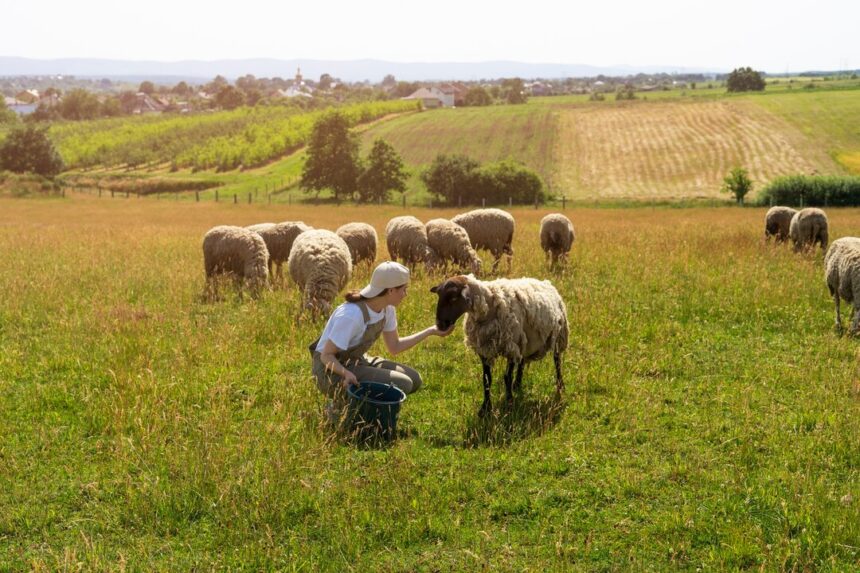Sheep farming is an integral part of the agricultural landscape in South Africa, with a rich history and diverse array of breeds contributing to the country’s livestock industry. From wool production to meat and dairy, sheep play a vital role in providing valuable resources and livelihoods for farmers across the nation. In this article, we’ll explore 20 essential things to know about breeding and farming sheep in South Africa, highlighting key insights into their management, production, and significance in the agricultural sector.
1. Diverse Breeds
South Africa is home to a wide variety of sheep breeds, each with its unique characteristics and attributes. From Merinos and Dorpers to Damaras and Meatmasters, farmers have a range of options to choose from based on their production goals and environmental conditions.
2. Wool Production
Merino sheep, renowned for their fine wool, are the predominant breed for wool production in South Africa. The country’s Merino wool is prized for its quality and consistency, making it a valuable commodity in both domestic and international markets.
3. Meat Production
Meat-producing breeds like Dorper and Damara sheep are popular choices for farmers focused on meat production. These breeds are known for their superior meat quality, fast growth rates, and adaptability to harsh environmental conditions.
4. Dual-Purpose Breeds
Some sheep breeds, such as the South African Meat Merino (SAMM) and the Meatmaster, are dual-purpose breeds suitable for both wool and meat production. These breeds offer farmers flexibility in their production systems and can be tailored to meet specific market demands.
5. Grazing Management
Effective grazing management is essential for sheep farming in South Africa, given the country’s diverse climate and vegetation types. Rotational grazing, pasture improvement, and strategic stocking rates are key strategies employed by farmers to optimize forage utilization and maintain pasture health.
6. Reproductive Efficiency
Reproductive efficiency is crucial for maximizing productivity in sheep farming. Ewes are typically bred once a year, with lambing usually occurring in the spring or early summer months to coincide with optimal forage availability.
7. Lambing Management
Proper lambing management is essential for ensuring the health and survival of newborn lambs. Farmers employ various practices such as providing shelter, assisting with difficult births, and monitoring for signs of illness or distress in newborns.
8. Health and Disease Management
Sheep are susceptible to a range of diseases and parasites, necessitating proactive health management measures. Vaccination programs, parasite control, and routine health checks are essential for maintaining the overall health and well-being of the flock.
9. Nutrition and Feeding
Nutrition plays a crucial role in sheep farming, particularly during periods of high production such as gestation and lactation. Balanced diets, supplemented with minerals and vitamins as needed, help to support growth, reproduction, and overall flock health.
10. Breeding Programs
Selective breeding programs are used to improve desirable traits in sheep breeds, such as wool quality, meat yield, and disease resistance. Through careful selection of breeding stock and genetic testing, farmers can enhance the genetic merit and performance of their flocks over time.
11. Market Trends
Understanding market trends and consumer preferences is essential for successful sheep farming. Farmers must stay informed about changes in demand for wool, meat, and other sheep products to make informed decisions about breeding and marketing strategies.
12. Sustainable Practices
Sustainable sheep farming practices are increasingly important in South Africa, given concerns about environmental impact and resource depletion. Farmers are adopting sustainable grazing management, water conservation, and renewable energy solutions to minimize their ecological footprint.
13. Genetic Resources
South Africa’s diverse sheep breeds represent valuable genetic resources that contribute to global genetic diversity and breed conservation efforts. Preservation of indigenous breeds and promotion of genetic diversity are critical for the long-term sustainability of the livestock industry.
14. Technology Adoption
Advancements in technology, such as electronic identification (eID) systems, precision farming tools, and genomic testing, are transforming sheep farming practices in South Africa. These technologies offer opportunities for improved productivity, efficiency, and animal welfare in the industry.
15. Livestock Guardian Animals
Livestock guardian animals, such as dogs and llamas, play a vital role in protecting sheep flocks from predators. These animals help to deter predators, reduce losses due to predation, and provide peace of mind for farmers.
16. Export Opportunities
South Africa’s reputation for high-quality sheep products presents export opportunities for farmers in international markets. Exporting wool, lamb, and value-added sheep products can provide additional revenue streams and access to new markets for South African producers.
17. Climate Resilience
Sheep farming in South Africa requires resilience to climate variability and extreme weather events. Farmers employ adaptation strategies such as drought-tolerant forage species, water conservation measures, and supplementary feeding during periods of drought to mitigate risks and maintain flock health.
18. Economic Contributions
Sheep farming makes significant economic contributions to rural communities and the national economy in South Africa. The industry provides employment opportunities, generates income for farmers and agribusinesses, and supports downstream industries such as wool processing and meatpacking.
19. Cultural Heritage
Sheep farming has deep cultural significance in South Africa, with traditional farming practices and husbandry techniques passed down through generations. Sheep farming plays a central role in cultural celebrations, rituals, and traditions in many rural communities across the country.
20. Future Outlook
The future of sheep farming in South Africa is promising, with opportunities for innovation, growth, and sustainability. By embracing technology, adopting best practices, and leveraging genetic resources, farmers can continue to enhance the productivity, profitability, and resilience of the industry for generations to come.
Breeding and farming sheep in South Africa encompass a diverse array of breeds, practices, and opportunities that contribute to the country’s agricultural heritage and economic development. With careful management, innovation, and a commitment to sustainability, sheep farming will continue to thrive and evolve to meet the challenges and opportunities of the future.
Join 'Farmers Mag' WhatsApp Channel
Get the latest Farming news and tips delivered straight to your WhatsApp
CLICK HERE TO JOIN






